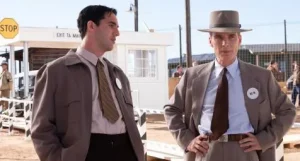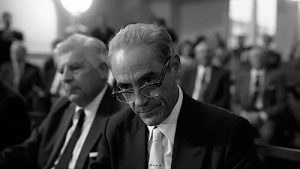Oppenheimer

(Directed by Christopher Nolan) (2023)
On 16 July 1945, the first atomic bomb was detonated, at a test site named “Trinity”, in New Mexico, USA. It went so well that, on 6 August 1945 at 8.15 am, the US tried it on an actual city: Hiroshima. A blinding flash shot over the city, and then some 100,000 people were vapourised. The morning turned dark; a priest, Father Kleinsorge, wandered in the garden of his mission, dazed and bleeding, to see his housekeeper, Murata-san, crying out “Shu Jesusu, awaremi tamai!” (‘Our Lord Jesus, have pity on us!’).*
Of course, President Truman’s decision to bomb Hiroshima (and Nagasaki, three days later) was justified (arguably justifiable) by calculations that an invasion of Japan would cause even more death and destruction than the atomic bombs (not forgetting the fire-bombing of Tokyo). We suspect the Japanese soldiers, and perhaps citizens, would have fought like cornered cats: nevertheless, was any thought given to a blockade to bring about a fairly peaceable surrender?
Whilst, as Tom Waits sang, there is no Devil, it’s just God when drunk, we fear God has got onto the harder stuff. Now a junkie, She makes it her enigmatic aim to devise novel ways for humankind to self-immolate. The Manhattan project scientists had a notion that setting-off an atomic bomb might cause a chain reaction that would ripple well beyond the target; much like the boffins at the hadron collider project feared they might create an Event Horizon, or the tech-heads who speculate about where Artificial Intelligence might end up.
I’m writing this review in the Christopher Nolan film style, viz., it’s all over the place, like fissile isotopes. The moral issues of bombs are worth discussing but unlike most moral issues, these ones pose real issues. Nolan’s vivid film uses brilliant but flaky atomic physicist, J. Robert Oppenheimer (22/4/1904 -18/2/1967) to present but not resolve some of these issues. Played staringly well by glassy-eyed Cillian Murphy (Montgomery Clift would have been the perfect choice, but was unavailable), in the manner of a Gaelic midfielder who has just learnt he’s been cut from the team, the eponymous hero is a masochistic martyr and mystic, well described by a colleague as “not only self-important, but important.”
We track through the dimensions in a dazzling but migraine-inducing shower of sparks and splinters, as the director splits the atoms of linear time and narrative continuity. Here’s Oppy being ridden by his girlfriend (played by Florence Pugh, who has nothing to do but strip or put her head in the bath) whilst reciting the Bhagavad Gita, in Sanskrit, yet: “Now I am become Death, the destroyer of worlds”, a glorious mis-reading. Or there, chalking university blackboards and bothering Albert Einstein (Tom Conti). Or everywhere, developing the atomic bomb and agonising over whether it is a sign of moral turpitude. We doubt that President Truman (an unrecognizable Gary Oldman) really said of Oppy ‘Don’t let that cry-baby into this [Oval] office again,’ but you get the gist.
The development and final testing of the bomb are thrilling, brilliantly done. The use of sound – the overt emphasis on vibration – is very clever, and the soundtrack complements this. The pre-war and wartime competition to get there first, the internal debates and wrangling over scarcity of materials, security, military and political interference with science, and so on, are wittily done, and for the most part, refreshingly-free of agitprop. Where the film begins to founder is in the overlong aftermath, when Nolan delves into the humiliating stitch-up to which Oppy was subjected in the hot part of the Cold War, when he lost his security clearance, along with a few friends. This is the most conventional and least impressive part of the picture, albeit that the villain of the piece, Lewis Strauss, is portrayed with customary force by Robert Downey Jr.
This not a black and white matter (although Nolan often can’t decide when to add colour to his set pieces, which go from b/w to many hues for no apparent reason): By the time Strauss raised doubts about Oppenheimer, the Cold War was at full pitch: Klaus Fuchs (also at Los Alamos) had leaked atomic secrets to the Russians and was arrested in 1950; Oppenheimer, though not a card carrying Communist, was certainly a fellow traveller and no Republican; and there was personal animus, for the haughty professional physicist, progressive, and lapsed Jew, from the amateur-scientist, conservative Jewish banker who happened to head the Atomic Energy Commission, and was charged with developing thermonuclear superiority over the Soviet Union. Regrettably, we do not get a very nuanced treatment of this episode, which was, at the time, highly partisan and highly political. One hoped for better. This does not include the way Edward Teller is framed in the film (played with verve by Benny Safdie). Teller was a brilliant physicist and ‘father’ of the Hydrogen Bomb, which was opposed by Oppenheimer (and others). He was certainly not a warm and lovable human being, but he is shown to have had a sense of honour; after he gives rather equivocal evidence to the security hearing, Oppy shakes his hand, much to the disgust of wife Kitty.
The performances are fine. Matt Damon as Brigadier General Leslie Groves is particularly good. Emily Blunt has a nice way with a martini-soaked sneer (we liked it when, introduced to the modest and countryfied Trinity site where they were to live whilst the Manhattan Project was completed, she said “All that’s missing is a saloon“) but she had the burden of being a 1950s wife, with not much to do, and this was replicated in her role as well. Small key roles were nicely done: Those mentioned above; plus Casey Affleck as a soft-spoken but chilling security man; Kenneth Branagh as an avuncular Niels Bohr; Jason Clarke as a zealous investigating counsel; Matthias Schweighöfer as the suavely sinister Werner Heisenberg.
In the final analysis, as JFK, who gets a brief mention in the film, used to say, Oppenheimer is a worthy film well worth watching. Cut some speeches and staring. And let’s dig deeper into Oppenheimer the Man. A brief exegesis on fission and fusion wouldn’t go astray either, for those of us who skipped physics and chem. in school.
[*John Hersey, Hiroshima (1946), p. 27.]
Leave a comment...
While your email address is required to post a comment, it will NOT be published.






0 Comments